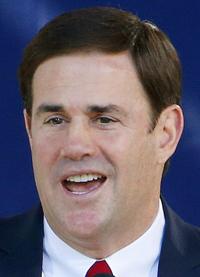PHOENIX — The head of a Koch-funded think tank at Arizona State University says it makes more financial sense to spend land trust dollars on current education expenses rather than “hoard” them for future generations.
Money will be worth less in the future, Scott Beaulier said in a report being released today.
Tapping into the trust now — including the principal — will result in a bigger bang for the buck, he said.
The study by Beaulier, executive director of the Center for the Study of Economic Liberty, strongly backs the proposal by Gov. Doug Ducey to boost education funding by withdrawing a lot more from the $5.1 billion trust fund than current levels.
While some of the competing plans do tap the trust for more than current withdrawals, none do so to the extent sought by Ducey. And some bypass trust money, instead using money the state already has in surplus and its separate “rainy-day” fund.
But Beaulier, while acknowledging his anti-tax and free-market economic perspectives, said he didn’t specifically start out to validate the governor’s plan. And he said although the think tank got started with money from a foundation set up by anti-tax billionaire Charles Koch, whose political organizations have previously funded Ducey-backed proposals, that does not affect the research.
The trust fund consists of proceeds from the sale and lease of lands Arizona was given by the federal government when it became a state. Today 9.2 million acres are left of the original 10 million acres.
Using a voter-approved averaging formula, public schools draw 2.5 percent of what’s in their share of the trust, currently close to $80 million a year.
Ducey proposes to up that to 10 percent for five years, then 5 percent for the following five, generating perhaps an extra $3 billion over that time period.
The governor is arguing for the proposal based on the idea that even tapping into the principal, the trust, now worth $5.1 billion, would still be worth $5.4 billion at the end of that time.
In contrast, Beaulier said, keeping withdrawals at current levels will grow the trust to close to $10 billion by 2026.
But state Treasurer Jeff DeWit said that assumes a growth rate of 6.9 percent, something he said is questionable in a fund where 60 percent of the funds are in stocks.
And even if that occurs, DeWit said any growth has to be discounted for inflation which makes future dollars worth less, even as the state has more students it needs to fund.
Beaulier said he sees the issue differently.
“The role of the trust is not to squirrel money away, but rather to maximize benefits to its beneficiaries,” his report says.
And Beaulier said it makes more sense to take money for the current crop of students than to save it for those to come.
For example, he said if there is massive inflation, the value of the annual payouts is going to be worth “a heck of a lot less in real terms.”
“If you expect inflation, you should probably be a little bit more biased to the present,” he said, justifying spending the money now when it’s worth more. Still, Beaulier said there are limits to that argument.
“I’m not saying, like, burn the endowment down,” he said. “But it should tip policy a little more in the direction of paying out more now as opposed to holding it for a future distribution.”
And what of DeWit’s concern that taking out more money now robs from future generations?
“Yes, there will be more kids,” he said. “And the dollars will be spread across more people.”
But Beaulier said he also believes that our descendants will live better than we do now.
“Any time the permanent fund administrators defer payments to future beneficiaries over current ones, they are taking from a relatively poor generation (i.e., Arizonans living in the present) and rewarding our relatively rich descendants (i.e., future Arizonans),” he wrote.
And Beaulier said there’s another reason to spend now.
“If education in future generations will be more costly, then why not consume more of it today when it is cheaper?” he writes.
“Some believe education costs will fall thanks to major innovations and technological disruptions,” Beaulier continues. “But if the recent past is any predictor, rising costs point to spending more now to avoid less money per dollar in the future.”
He also called spending money now “human capital investment,” ranging from smaller classes to state-of-the-art technology.
Beaulier denied that the bent of his work is affected by the source of his center’s funding.
“We’re pretty transparent about who supports us,” he said. The organization is led by a $3.5 million gift from the Charles Koch Foundation to set up the think tank.
But, he said, once the money comes in, “we’re basically left to do our thing.”
However, the center’s statement of purpose says it is “committed to the study of the role economic liberty and the free enterprise system play in increasing opportunity and improving well-being.”
Among Beaulier’s commentaries is one against higher Arizona taxes, saying they “stifle economic growth, kill jobs, and, ultimately, fail to deliver the revenue needed to improve state finances.”




